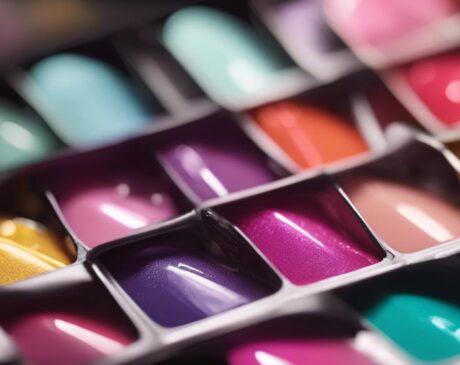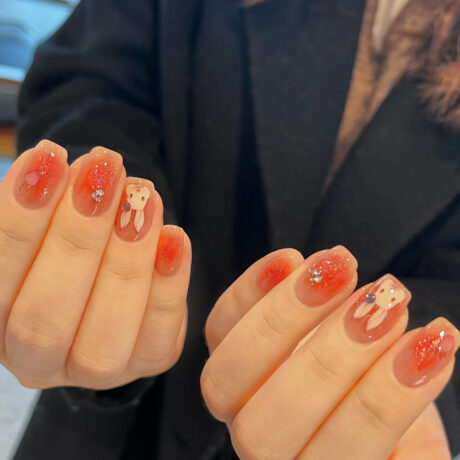Can You Put Nail Glue on Your Real Nails?
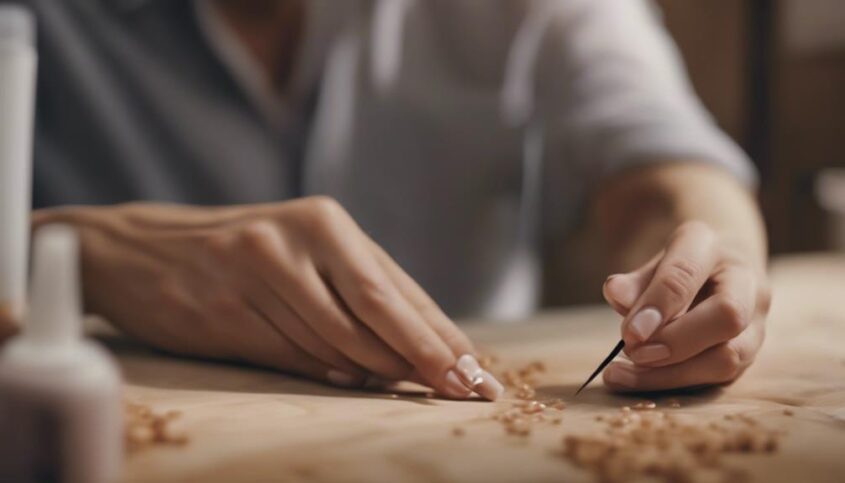
Applying nail glue directly onto real nails can weaken them, leading to brittleness, peeling, and even infection. Allergic reactions to the glue can cause redness, itching, and swelling. Proper application techniques, such as sparing use and avoiding skin contact, are crucial. Using nail glue excessively can harm nail breathing and cause long-term damage. It's essential to weigh the risks before using nail glue on real nails.
Key Takeaways
- Nail glue should be applied sparingly on clean, dry, and oil-free nails to avoid damage.
- Avoid direct contact with skin to prevent irritation or potential allergic reactions.
- Improper application of nail glue can weaken natural nails and cause brittleness.
- Removal techniques like acetone soak should be used carefully to prevent nail damage.
- Opt for safe alternatives like adhesive tabs or natural nail strengtheners to maintain nail health.
Safety Concerns
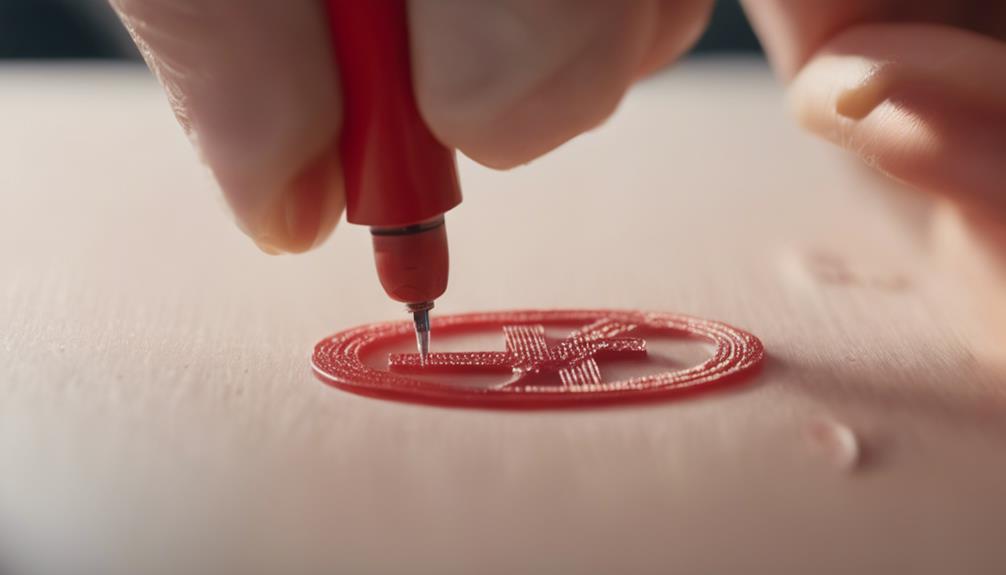
When considering whether to put nail glue on your real nails, it is crucial to address the safety concerns associated with this practice. The primary concern is the potential damage that nail glue can cause to your natural nails. Nail glue contains strong chemicals that can weaken the nail bed, leading to brittleness, peeling, and even infection if not applied correctly. Additionally, some individuals may develop allergic reactions to the ingredients in nail glue, resulting in redness, itching, or swelling around the nail area.
Moreover, improper application of nail glue can result in accidental skin contact, leading to skin irritation or chemical burns. It is essential to follow the manufacturer's instructions carefully, use the glue sparingly, and avoid getting it on your skin to minimize these risks. Furthermore, using nail glue frequently or for extended periods can prevent your nails from breathing properly, potentially causing long-term damage.
Types of Nail Glue
Considering the various aspects of nail care and safety, understanding the different types of nail glue available can help individuals make informed decisions regarding their nail enhancement choices. Nail glues generally fall into two main categories: cyanoacrylate-based and methacrylate-based. Cyanoacrylate-based nail glue is the most common type and is known for its quick-drying and strong bond. It is suitable for use with artificial nails, such as acrylic or press-on nails. On the other hand, methacrylate-based nail glue is less common and is usually recommended for professional use due to its stronger chemical composition, which can be harsher on natural nails if not applied correctly.
Within these categories, there are variations in formulas, such as gel or brush-on nail glues. Gel nail glue is thicker and provides more control during application, while brush-on nail glue offers convenience and precision. It is essential to choose a nail glue that suits your needs and skill level to ensure a successful and long-lasting nail enhancement application.
Application Process
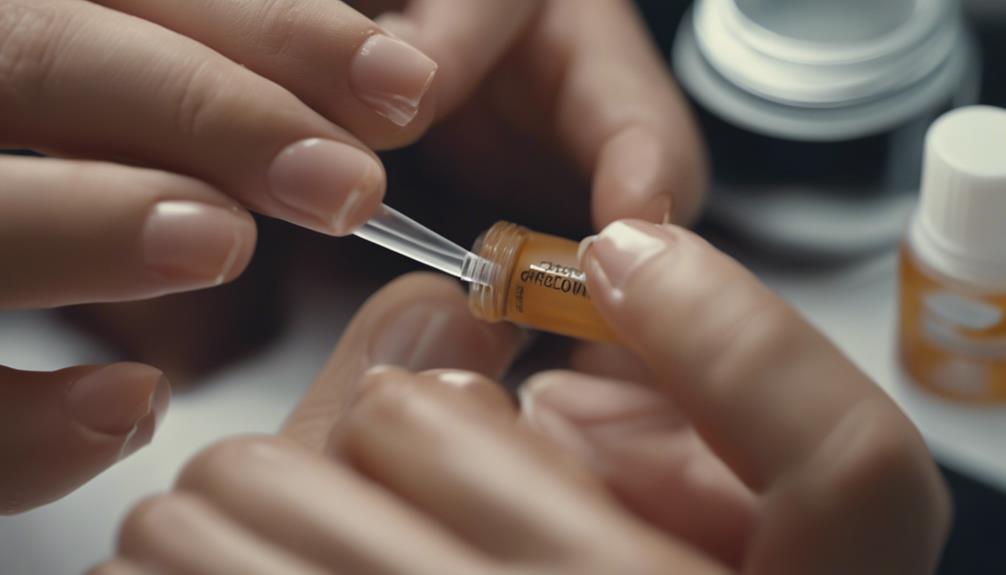
When applying nail glue on your real nails, it is crucial to prioritize safety to avoid any potential harm or damage. Additionally, understanding the proper techniques for removing nail glue is essential to maintain the health and integrity of your nails. By focusing on these points, you can ensure a successful and safe application process for your nail glue.
Nail Glue Safety
Ensuring the safe application of nail glue involves adhering strictly to the recommended process to prevent any potential harm or damage to your natural nails. Before applying nail glue, ensure your nails are clean, dry, and free from any oils or lotions. Apply a small amount of glue onto your natural nail, avoiding contact with the skin or cuticles. Gently press the artificial nail onto your natural nail and hold in place for a few seconds to allow the glue to set. Avoid using excessive amounts of glue, as this can lead to nail damage or potential allergic reactions. Always store nail glue in a cool, dry place and keep out of reach of children to prevent accidents.
Proper Removal Techniques
What is the recommended approach for safely removing artificial nails that have been attached using nail glue? To ensure the health and integrity of your natural nails, it is crucial to follow proper removal techniques. Begin by soaking a cotton ball in acetone-based nail polish remover and placing it on the glued area. Secure the cotton ball in place with aluminum foil to allow the acetone to break down the adhesive gently. After 10-15 minutes, remove the foil and gently push off the artificial nail using a cuticle stick. Avoid forcefully pulling or prying the nail, as this can cause damage to your real nails. Once all artificial nails are removed, moisturize your nails to restore hydration and strength.
Removal Methods
To safely remove nail glue from your real nails, it is essential to follow specific steps to prevent damage or harm to your nails. Here are three effective methods to remove nail glue without causing harm:
- Acetone Soak: Soaking your nails in acetone can help dissolve the nail glue. Simply pour acetone into a bowl and soak your nails for about 10-15 minutes. Gently rub the nails with a soft brush or cotton pad to remove the softened glue.
- Peeling Method: If the nail glue is starting to peel off on its own, you can gently peel it away. Be cautious not to force the glue off, as this can damage your nails. Use a cuticle pusher or wooden stick to gently lift the glue from the nail surface.
- Warm Water Soak: A warm water soak can also help loosen nail glue. Soak your nails in warm, soapy water for 10-15 minutes to soften the glue. After soaking, gently buff the nails with a nail buffer to remove the softened glue residue.
Alternatives to Nail Glue
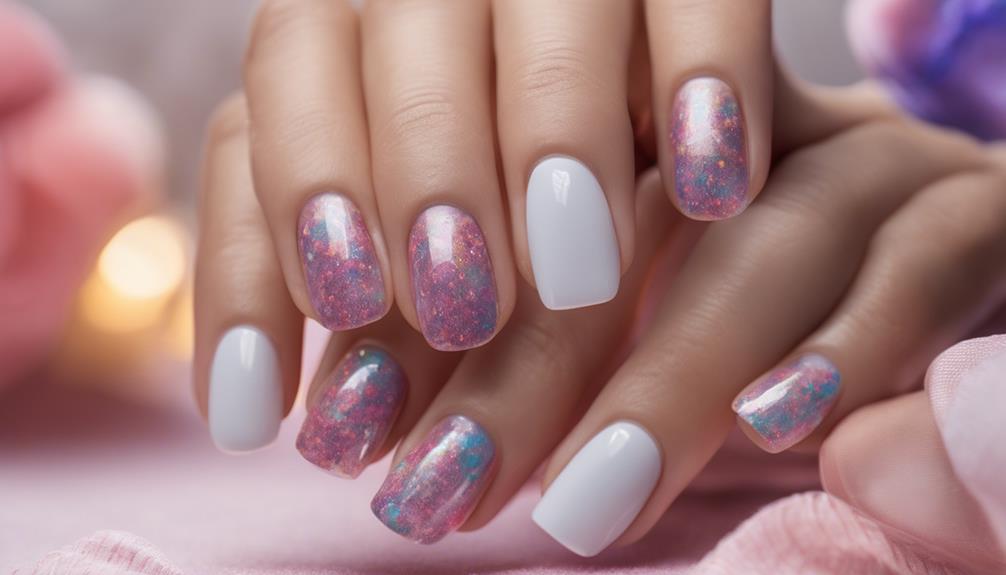
When considering alternatives to nail glue, it is essential to explore safe nail adhesives, which provide a secure bond without damaging your natural nails. Additionally, natural nail strengtheners can be a great option for those looking to enhance the health and resilience of their nails without the use of traditional adhesives. DIY nail care solutions offer a customizable approach to nail maintenance, allowing individuals to tailor treatments to their specific needs and preferences.
Safe Nail Adhesives
Safe alternatives to traditional nail glue for attaching artificial nails include nail adhesives specifically formulated for sensitive nails, such as brush-on nail glue or adhesive tabs. These alternatives provide a gentle yet effective way to apply artificial nails without causing damage to the natural nails. Here are three safe nail adhesive options to consider:
- Brush-On Nail Glue: This type of adhesive allows for precise application, reducing the risk of excess glue touching the skin or cuticles.
- Adhesive Tabs: These tabs offer a temporary solution for attaching artificial nails without the need for any harsh chemicals or glue removers.
- Sensitive Nail Adhesives: Formulated for those with sensitive nails, these adhesives are gentle yet strong, providing a secure bond for artificial nails.
Natural Nail Strengtheners
Natural nail strengtheners serve as effective alternatives to traditional nail glue, promoting healthier and stronger nails without the need for adhesives. These products are enriched with vitamins, proteins, and minerals that nourish and fortify the nails, helping to prevent breakage and promote growth. Natural nail strengtheners come in various forms, such as serums, creams, and oils, providing flexibility for users to choose the best option for their nail care routine. By using natural nail strengtheners, individuals can enhance the overall health of their nails while avoiding the potential risks associated with nail glue. These strengtheners are a safer and more sustainable way to achieve beautiful and resilient nails without compromising on health and safety.
DIY Nail Care
For those seeking alternatives to traditional nail glue, exploring DIY nail care methods can provide effective solutions for maintaining strong and healthy nails. Here are three simple and natural DIY nail care alternatives to traditional nail glue:
- Oil Soak: Soaking your nails in warm olive oil or coconut oil can help strengthen and moisturize your nails, promoting overall nail health.
- DIY Nail Strengthener: Creating a homemade nail strengthener using ingredients like garlic and lemon can help fortify your nails and prevent breakage.
- Cuticle Care: Regularly moisturizing and massaging your cuticles with natural oils like jojoba oil can improve nail growth and strength from the base.
Potential Damages
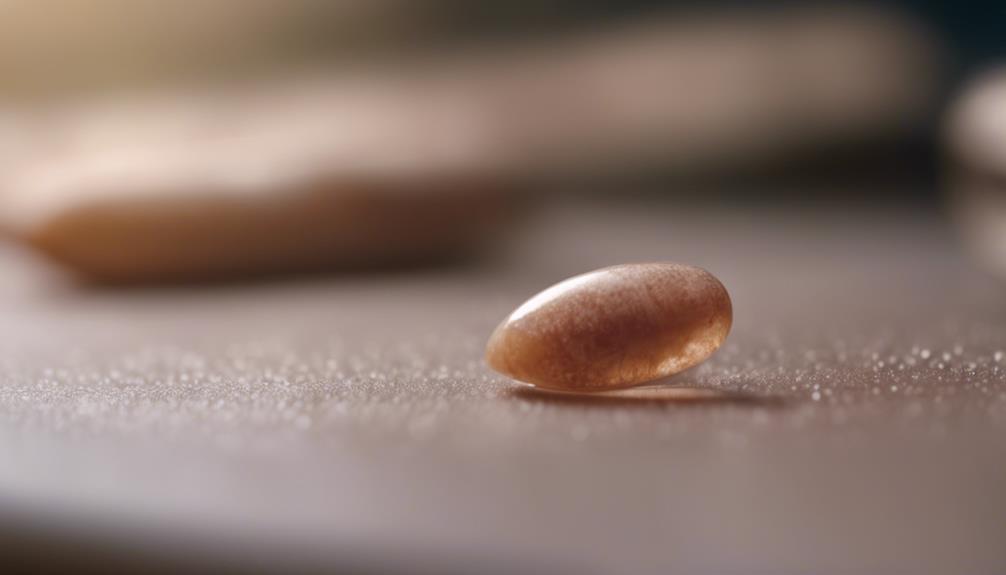
When considering the application of nail glue on real nails, it is crucial to be aware of the potential damages that may arise from improper usage. Nail glue contains strong adhesives that can cause harm if not applied correctly. One common issue is allergic reactions to the chemicals in the glue, resulting in redness, swelling, or irritation around the nail bed. Furthermore, using nail glue excessively or incorrectly can lead to nail damage, such as weakening, brittleness, or even nail loss. Improper application may also result in accidental skin bonding, causing pain and potential injury when trying to remove the glue. Additionally, if the glue is applied too close to the cuticles or skin, it can lead to infections or damage to the nail matrix, affecting the growth and health of the nail. To prevent these potential damages, it is essential to follow proper nail glue application techniques and seek professional advice if experiencing any adverse reactions.
Expert Recommendations
Considering the potential damages that may arise from improper usage of nail glue on real nails, it is advisable to adhere to expert recommendations for safe application practices. Nail experts suggest the following tips to ensure the proper and safe use of nail glue:
- Patch Test: Before applying nail glue to your entire nail, it is recommended to do a patch test. Apply a small amount of glue on a small area of your nail and wait for any adverse reactions such as redness, irritation, or itching. This will help you determine if you are allergic to the glue or if it is safe for use.
- Avoid Skin Contact: When applying nail glue, be careful not to let it come in contact with your skin. Nail glue contains strong chemicals that can cause skin irritation or allergic reactions. Use a small amount and apply it precisely on the nail to avoid any contact with the surrounding skin.
- Proper Removal: To prevent damage to your natural nails, it is essential to remove artificial nails or nail enhancements properly. Do not force or peel them off, as this can lead to nail damage. Follow the recommended removal process to keep your nails healthy and strong.
Final Thoughts
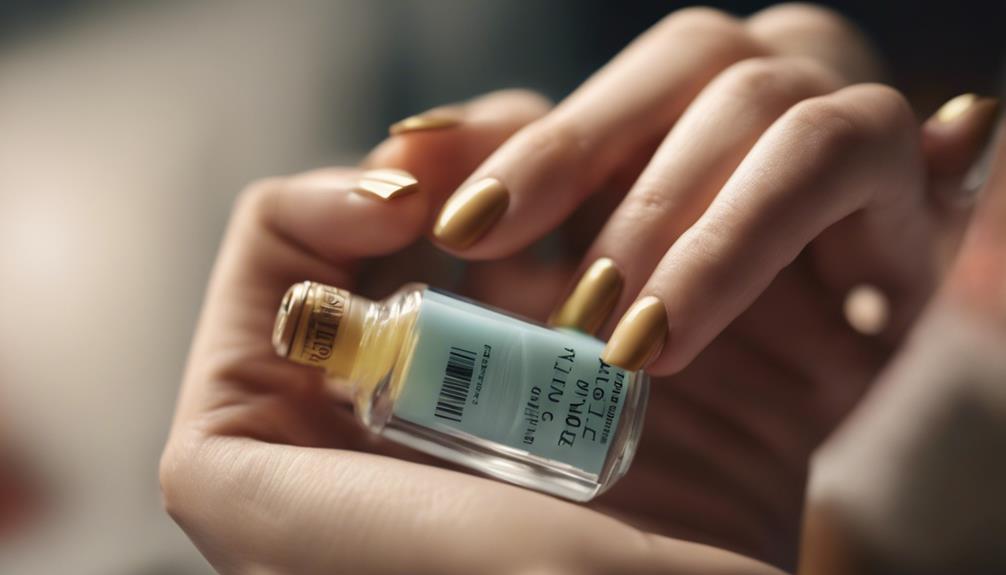
In conclusion, prioritizing proper application and removal techniques when using nail glue on real nails is crucial for maintaining nail health and integrity. To ensure the longevity and health of your natural nails, it is essential to follow expert recommendations diligently. This includes using nail glue sparingly, avoiding getting glue on the skin surrounding the nails, and never using nail glue to fix major nail issues like cracks or breaks.
Frequently Asked Questions
Can Nail Glue Be Used on Acrylic Nails?
Certainly! Utilizing the right adhesive for acrylic nails is crucial. Nail glue designed for acrylics provides a strong bond, ensuring durability and longevity. Remember, always follow proper application methods to achieve optimal results.
Is Nail Glue Safe for Children to Use?
Nail glue safety for children is crucial. Prioritize using kid-friendly, non-toxic formulas. Supervision during application is necessary to prevent ingestion or misuse. Educate children on proper handling. Consult a pediatrician if concerns arise.
Can Nail Glue Cause Allergic Reactions?
Nail glue can cause allergic reactions in some individuals due to its chemical composition. Symptoms may include redness, itching, swelling, or blistering around the nails. It is advisable to perform a patch test before using nail glue.
How Long Does Nail Glue Typically Last?
The longevity of nail glue can vary depending on factors such as application technique, quality of the product, and daily activities. Typically, nail glue can last for a few days to a couple of weeks when applied correctly.
Can Nail Glue Be Used to Fix Broken Nails?
Nail glue can effectively repair broken nails by providing a quick and temporary fix. It is important to follow proper application techniques and consider seeking professional advice for long-term solutions to maintain nail health.



